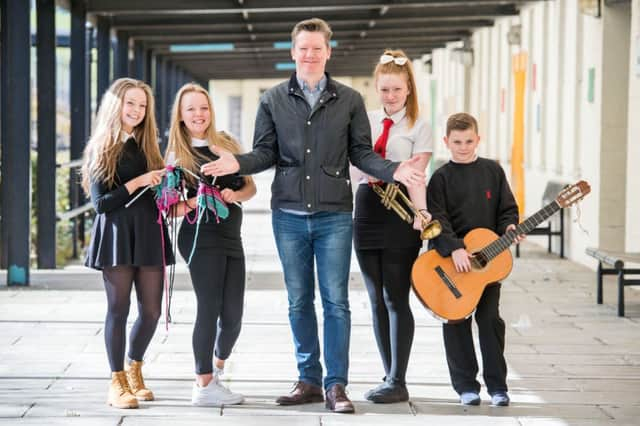Edinburgh Festival bid to change school’s fortunes


Castlebrae Community High in the city’s Craigmillar area, which is dogged by health and unemployment problems, was almost closed down two years ago before a last-minute reprieve.
Now its pupils will get the chance to work with artists and performers, create their own works of art and attend some of the festival’s most prestigious events over the next three years.
Advertisement
Hide AdAdvertisement
Hide AdSpecial workshops will be held at both the school and the festival’s headquarters on the Royal Mile, where students will get the chance to shadow key staff and create their own art installations. The first sessions were held this month.
The three-way partnership between the festival, the school and Edinburgh City Council has been announced weeks after new EIF director Fergus Linehan unveiled ambitions to give children’s shows and educational work a much greater emphasis during his tenure. At the time he said he wanted the event to inspire a new generation of arts lovers, describing them as “critical” to the event’s future.
Among the projects the school will work on will be its own version of singer-songwriter King Creosote’s “From Scotland With Love” project, which married songs with film footage, as well as “Art of Listening”, an initiative to develop listening and interpretation skills that the festival is working on with Harvard University.
Mr Linehan said: “This is a really exciting development of the year-round work the festival does in schools across the city.The future of the festival and the arts is in the hands of young people. We have to get out and make ourselves part of their everyday lives and expectations.
“Not everyone in this area will want to go to the Edinburgh Festival, but everyone should know about it and feel a sense that there’s something important happening in their city and feel a bit of pride in it.”
Between 12 and 18 dedicated sessions will be held with students each month under the initiative, which is being largely funded by the festival, which will celebrate its 70th anniversary in 2017. The project will see the revival of a former drama studio at the school, which the festival is properly kitting out.
Sally Hobson, the EIF’s head of creative learning, said: “We’ve actually been working with schools in Edinburgh for more than 20 years, including every primary school in the city.
“But this is the first time that there’s been a three-year arts partnership with a specific school, which will be a lot more high-profile and will be at the very centre of the festival itself. Myself and Fergus were really keen to see if we could work in more depth with a school and what effect we could have on a school over a longer period of time. Not many of these kids have heard of the Edinburgh Festival – lots of them don’t even go into the city centre.”
Advertisement
Hide AdAdvertisement
Hide AdEducation officials wanted to close down the school in the summer of 2013, due to some of the country’s worst exam results and truancy rates, and a dwindling roll of under 170 pupils who were due to be decanted into other neighbouring schools. But councillors intervened after protests and agreed to keep the existing school, which was just 23 per cent full at the time, open until a new one is built in the area in 2020.
Headteacher Norma Prentice said: “There is a lot of excitement about the project now it is up and running. Initially the perception was that the festival was very removed from this area and wouldn’t have been accessed by the local community here. But taking the festival into the school and the students out into the festival has already got them talking and thinking about it. It’s already made a phenomenal difference to our art department.”
Richard Lewis, the council’s new festivals and events champion, said: “The Edinburgh International Festival has an international reputation but this is also the city’s festival and it is crucial that local communities and younger generations can get involved, as well as visitors from all over the world.
“Schoolchildren are Edinburgh’s future performers.”
ANALYSIS
Joyce McMillan: Subtle shift that aims to make real difference
LIKE any arts organisation with its eye on the future, the Edinburgh International Festival has always undertaken a fair amount of educational and outreach work in schools.
This announcement, though, suggests the kind of subtle but well-judged shift in emphasis that’s becoming a hallmark of Fergus Linehan’s first months as Festival director.
By focusing intensively on one Edinburgh secondary school – and one in an area with multiple problems, where the school itself has been threatened with closure in recent years – the Festival both makes it easier for the public, the media and funding bodies to grasp what its outreach work is aiming to achieve, and increases its chances of making a substantial difference to the lives of children and young people in one of the city’s most deprived areas. As the success of the recent Sistema initiative shows, it’s the kind of project that is likely to delight the Festival’s key funding bodies, including the Scottish Government and Edinburgh city council.
And although EIF, unlike year-round arts organisations, doesn’t have a constant supply of in-house artists available to deliver outreach projects, there’s no doubt the EIF under Linehan is determined to use its unique global network to make a real difference to some of Edinburgh’s least privileged youngsters.
FOLLOW US
SCOTSMAN TABLET AND MOBILE APPS